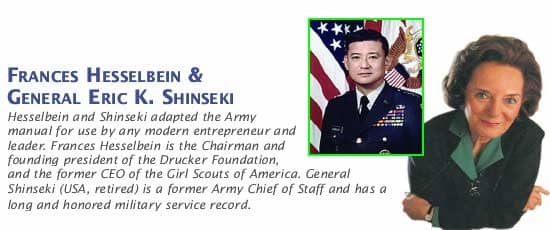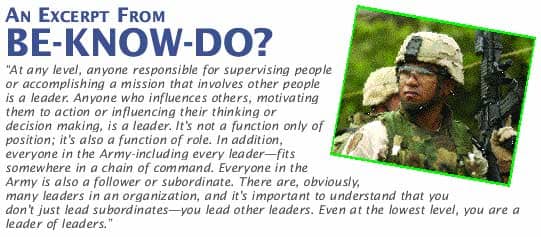So, how do they do it? An unlikely team composed of a retired Army Chief of Staff and the former CEO of the Girl Scouts of America sought to find out. These two individuals, General Eric K Shinseki and Frances Hesselbein, set out to capture the essence of the military's secrets, and put them in a form that can be used by anyone who aspires to leadership. These proven principles will serve business, government or non-profits equally well. If you understand that leadership is more than management and communications skills, you will profit greatly from what Shinseki and Hesselbein discovered. If you grasp that leadership is character-driven, and depends more upon what you are than what you know, you will appreciate the military approach.
Command-And-Control?
People still consider the Army a stereotypical command-and-control organization. To many it seems that leadership is unnecessary when you can simply order people to do things. That may have been true at one time. However, in the modern military, this is not the way things are done. Far from it. The Army Leadership Manual (22-100) has three words on its cover: “BE-KNOW-DO.” “BE” stands for character, the key element of leadership. “KNOW” stands for knowledge, and “DO” stands for action. There are two passages in BE-KNOW-DO that I wish to underscore. The modern Army Leadership Manual defines leadership in this way:
“Leadership is influencing people-by providing purpose, direction, and motivation-while operating to accomplish the mission and improving the organization... Leadership transforms human potential into effective
performance.”
Some may respond that although this sounds good, it is principally a directive for officers and sergeants. Today’s Army, however, puts forth a much broader definition of leadership in its leadership manual:
“At any level, anyone responsible for supervising people or accomplishing a mission that involves other people is a leader. Anyone who influences others, motivating them to action or influencing their thinking or decision making, is a leader. It's not a function only of position; it's also a function of role. In addition, everyone in the Army-including every leader-fits somewhere in a chain of command. Everyone in the Army is also a follower or subordinate. There are, obviously, many leaders in an organization, and it's important to understand that you don't just lead subordinates-you lead other leaders. Even at the lowest level, you are a leader of leaders.”

But where do you find people of such character to fill the entry levels of an organization? Unlike the military, if we look hard enough outside the organization, we can hire executives who are brilliant and accomplished. However, these executives rarely will talk one-on-one to a customer. It is staff level associates who interface with guests in our stores, sell them merchandise, handle problems, and deliver furniture. To the customers they serve, these associates ARE the store they represent. In other words, they are your Brand. In a manner of speaking, they are YOU. These front line associates are the pool from which you should draw your future leaders. But, how do you instill leadership skills and passion for your corporate mission in these associates? You do so by applying the same principles that the enlightened military applies. You do it with what I call the “MetaValues® Template.” You can apply this template in a single department, if you are a manager. You can apply this template yourself, whether you own a small home furnishings stores or a large chain.
The Myth of Relative Values
Let's dispense with a big myth right now. You have heard people say: “My values are my business, yours are yours.” This is a completely false idea, and no one could possibly operate successfully in the business world believing that a person's personal core values don't really matter that much. The fact is, there are three values we all insist upon in any business associate. Perhaps we insist upon these three values unconsciously, but we do insist upon them. I call these MetaValues®: Integrity, Excellence, and Caring. Here is why these three MetaValues® are essential to successfully getting the right people on the bus:
Integrity: We must trust our associates. We must believe they are telling us the truth. Likewise, associates must trust the organizations they work for. If they don't, the organization is in for big trouble.
Excellence: We want associates around us who strive to do excellent work. They may not be perfect, but if they hold the value of Excellence high and seek to reach it, they will constantly improve, and they will hustle when a mistake is made. But if they are indifferent to the quality of the work they produce, they will be a constant thorn in our side.
Caring: We do not want associates who are indifferent to our feelings and the feelings of other associates, customers, vendors, and the community at large. No matter how good their work is, sooner or later such an individual will cause major problems.

Recruit Associates Who Share Your Values
The three key MetaValues® are the reason I have modified the conventional wisdom statement: “Our people are our most important assets,” to “People who share our core values are our most important assets.” As Jack Welch put it:
“Numbers and values. We don't have the final answer…. people who make the numbers and share our values go onward and upward. People who miss the numbers and share our values get a second chance. People with no values and no numbers - easy call. The problem is with those who make the numbers but don't share the values... we try to persuade them; wrestle with them; we agonize over these people.”
We all know that there are diamonds in the rough out there, people without impressive resumes or academic credentials. And we also know it is these individuals who are most likely to qualify for positions that bring them face-to-face with our customers on a regular basis. How do we attract them, hire them, train them and keep them? Once again we can learn a great deal from the military.
Much more commitment and better resources, especially human resources, must be devoted to organizational recruitment. In the Marine Corps, for example, the sharpest, smartest, and best members of the Corps are selected to be recruiters. Recruitment duty can make or break a Marine's career. Being a successful recruiter can assure moving forward. But failure can be a career disaster. Yet most companies treat entry-level aspirants in a rather demeaning manner. They are too often handed applications by an impersonal receptionist and find themselves forced to fill them out in a bustling lobby area. Instead of continually raising the intellectual bar to screen out applicants, businesses should consider looking for MetaValue® qualities such as Integrity, Excellence and Caring, things that can be identified through probing interviews and questionnaires. To get the right entry-level people on the bus, a MetaValues® template should be the benchmark-proper training and an authentic MetaValues® culture will do the rest. Research indicates that high IQ and technical skills are far less crucial to leadership than is mature self-awareness. Many people are surprised to learn that President John F. Kennedy's IQ was tested at 119, a high score but hardly genius level. Yet JFK's leadership skills are legendary, and his mastery of concepts and presidential tasks held sway over an entire intellectual community.
Train Your Associates in Your Core Values
The Army and the Marines do not precisely define their cultures in terms of MetaValues®, but MetaValues® are clearly honored by these organizations. And the Army, according to Hesselbein and Shinseki, is today the most innovative training organization in the world. As I have written, the Army must develop and promote leaders within their own ranks. It takes years to develop an excellent leader. So the Army's highest brass must devote themselves to developing new generations of leaders who can cope with the unknown future with its yet to be defined challenges. Although the time-tested principles of leadership must be honored, they are not enough. The military must strive to enhance the skills of future leaders with new, sophisticated competencies that are relevant to a volatile global situation in which the leader must operate and prevail.
If you are one of those entrepreneurs who despair at the current generation of Americans, look again. We have all heard the term “The Greatest Generation” applied to those who struggled and won World War Two. Not only the combat and support troops, but also the wives, mothers, and civilians who endured the long and bitter struggle.
Hesselbein and Shinseki tell us that these Americans learned about sacrifice, serving a cause greater than self, and about determination, teamwork and trust. A few generations have emerged since then, yet the military continues to produce superlative leaders and performers. They do so by applying values that attract “ordinary” minds and inspire the human soul. Perhaps the “greatest generation” has yet to be born. But the real issue for a business person is: How can the principles of leadership strengthen my own company? How can I train associates to the highest levels of Integrity, Excellence and Caring?
Obviously you must make a sincere commitment to training leaders. The military has learned that if an organization makes a significant commitment to training its associates in all aspects of its operation and core values, leaders will emerge. My premise is that training in the three core MetaValues® should be a requisite component in every corporate training program. A class or two in values will not suffice. The highest and most enlightened values must be part of a continuous training program for all levels of personnel.
A final quote from Hesselbein and Shinseki:
"In the post-9/11 world, leaders in all organizations can gain from the Army's approach to leadership. Even if we don't face the life and death challenges of combat, civilian leaders do face unprecedented change,
ruthless competition, unexpected threats, and battles for market
share-all of which can mean survival or destruction of products, careers and companies and have serious consequences for the people who are the heart and soul of all institutions.”
With the stakes so high, we can all agree that leadership is more important than ever. But leadership development is a continuous process, it must be cultivated with wisdom and patience, supported and inspired. In the next issue of FURNITURE WORLD, this concept will be developed further. Whatever management level you may inhabit, regardless of the number of people who report to you, you are not leading if you are not developing other leaders. In addition, as the Army Leadership Manual, BE-KNOW-DO will tell you, you must constantly strive to develop and improve your own skills as a leader. The Army does this better than any organization in the world, and in the next issue of FURNITURE WORLD we will tell you how they do it.
The material in this article was in part condensed from Larry Mullins' forthcoming book, THE METAVALUES REVOLUTION,
and is © Copyright 2004 by Larry Mullins, all rights reserved.